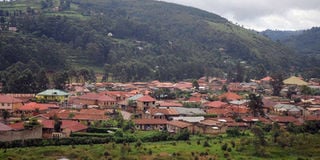Bugongi, Kabale’s biggest student hub

An aerial view of Bugongi in Kabale Municipality. PHOTO by Sarah Asiimwe
What you need to know:
A decade ago, a mention of Bugongi would earn you judgemental stares, no one would want to associate with this part of Kabale, but that has changed.
Bugongi is one of the former slum areas in Kabale Town developing at a high speed. It is located in Kabale Municipality; northern division off Makanga Road. About 10 years ago, Bugongi was known for prostitutes, thieves, and marijuana smokers.
Joyce Ndibwami, the LC1 chairperson of Lower Bugongi, says: “At least this time girls get married officially, we never used to have formal marriages because of prostitution, girls would just elope.”
A person who hailed from Bugongi was feared because of the bad reputation of the area. Bugongi has now changed; it has more churches than other parts of Kabale, and is a student hub.
“The trends have changed, No more prostitutes and criminals in Bugongi,” says Isaac Mucunguzi Rushoga, chairman Kabale Municipality Northern Division.
Bugongi is highly populated because it is near the town centre. Also, with institutions such as Bishop Barham University and Uganda College of Commerce in the neighbourhood, the population has grown tremendously, with hundreds of students residing in Bugongi. According to the Division headquarters, 2014 National Census put Bugongi’s population at 36,000, up from 25,000 in 2012. Despite the high student population, Bugongi does not have student hotels - students here rent rooms attached to homes of their land lords.
However, some landlords have started constructing rooms separate from their residential houses to serve as students’ hostels.
Dianah Kansiime, who rents a self-contained single room, says she pays Shs120,000 per month. She says those who rent self-contained double houses pay between Shs200,000 and Shs250,000. Rental houses, which are not self-contained cost between Shs50,000 and Shs70,000. Commercial houses range from Shs120,000 to Shs150,000.
Besides being known for housing students, Bugongi is famous for local brews such as enturire and omuramba. It is also the home area of the Prime Minister of Uganda, DR Ruhakana Ruganda.
Land
A 50x100 plot is between Shs25m and Shs50m depending on the location, while a 100x100 plot of land costs between Shs80m and Shs200m. Half an acre of swamp land costs Shs4m.
Transport
The commonly used means of transport to Bugongi from the town centre are boda bodas (bicycles and motorcycles). A bicycle ride to Bugongi ranges from Shs500 to Shs700, while a motorcycle ride costs between Shs1,000 and Shs2,000. However, most people prefer walking to the town centre.
State of housing
Housing is a mixture of permanent and semi permanent houses. Slums are no more because all the dilapidated old buildings have been demolished and any new building coming up must have approved plans from the municipal Council.
Rushoga says plans are underway to construct government estates for civil servants in Lower Bugongi after negotiations between Kabale Municipal Council and National forest authority (NFA) are complete. The municipal authorities are trying to offer NFA land on Rwakashuju Hill in exchange for land in Bugongi forest reserve, which is about 10 acres for the construction of the staff estates.
Roads
The roads were all murram, but construction of tarmacked roads has started.
Florence Kyomuhangi, a local business operator in Bugongi, says availability of electricity and piped water from National Water and Sewerage Corporation has also stirred development in the area. She says about four protected water springs have also been constructed.
Businesses
Common businesses in the area are retail shops, restaurants, mobile money services, pork joints, bars, and diaries. There are many timber selling points around Bugongi and many workshops, which mostly deal in furniture.
Betus Orishaba, an attendant at Samdo’s, a popular restaurant among students, says her business is not at its best because Bugongi is still in the development stage.
“Students are our main customers and food prices in my restaurant range between Shs1,000 and Shs1,500,” Orishaba says.
Bugongi Central Market that was once a hub for prostitutes is being renovated to provide a conducive working environment for the business community and generate revenue for Northern Division and Kabale Municipality.
Health
Residents in Bugongi get health services from Rugarama and Kabale hospitals. Marie stopes main branch, St Johns health centre II, several private drug shops and clinics that are located in Bugongi area supplement health service delivery.
Security
Eric Kalemera, LC1 chairman of upper Bugongi says they are helped by crime preventers and police which patrol the area both day and night. People also mobilise themselves to make sure their property is safe and keep watch of their homes.
Rushoga says they have formed village security groups to help in detecting crime and reporting the suspects to the police. “Insecurity in the area is now history because many responsible citizens, especially the working class stay in this area unlike in the past where the place was for wrong doers. Issues of insecurity and crime rate are isolated and not a big worry since most parents were sensitised and took their children to school.”
Additional reporting by Robert Muhereza




